Published: 27 Apr 2021
Why is API Testing Indispensable For Today’s Complex Apps?
Last Updated: 26 Jul 2022
Today, with numerous solutions and applications available, it is a known fact that only the best performing among them will take the lead. Businesses need high-performing apps to deliver a great customer experience (CX) which further helps them stand in tough competition. With the technology taking up new levels of innovation, there is more demand for apps delivering exorbitant features using interconnected and complex apps. Today, complex apps with multiple layers are being added across the application’s architecture to ensure seamless service delivery to customers. These multiple underlying layers necessitate leveraging effective API testing for these complex apps to deliver a great CX.
Content
1. What is API testing?
2. What are the different types of API testing?
3. Why is there an increased need for API testing across industries?
4. What benefits do businesses get with API testing?
5. Broad steps involved in API Testing
6. Conclusion
7. How can TestingXperts (Tx) help?
8. Tx Differentiators
What is API testing?

Every application has three layers: a Data layer, an Application Programming Interface (API) layer, and a User Interface (UI) layer. An API forms the crux of an application as it contains critical business logic. It allows front-end users to interact with the back-end and enables the proper functioning of the software. Typically, API testing helps check the functionality, reliability, security, and performance of service layers or the more commonly known API layers. Since this layer directly touches the data layer and presentation layer, it is essential to check the service layers by leveraging API testing.
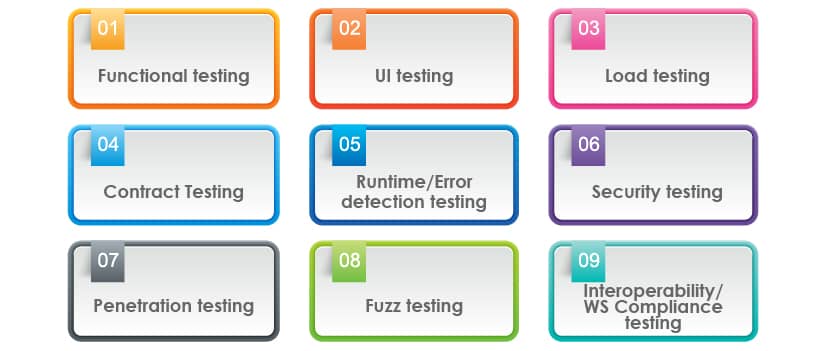
Functional testing:
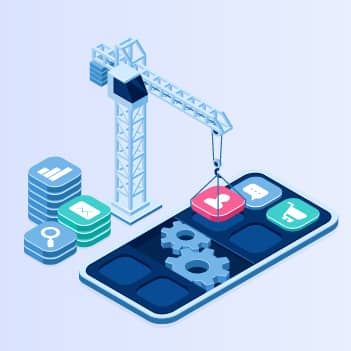
This testing method includes testing the specific functions within the API codebase. These functions represent the particular scenarios to ensure that the APIs function well and as expected within the given parameters.
UI testing:

This method tests the user interface of APIs and their constituent parts. This test method focuses more on the interface of the API rather than the API itself. Though this method does not test the API directly in terms of the codebase, it can still provide a generalized view of the API’s health, usability, and efficiency of both the front end and the back end.
Load testing:
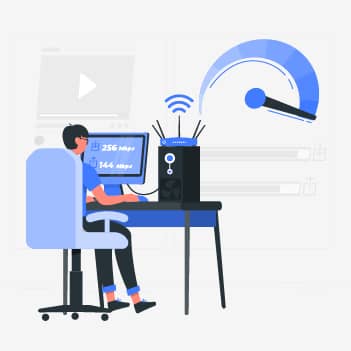
This method involves testing whether the API responds as expected under peak and varying load conditions. This test aims to determine how actively the API responds when various servers send a request to an API. This testing method ensures the APIs meet their compliances for response time and throughput.
Contract Testing:
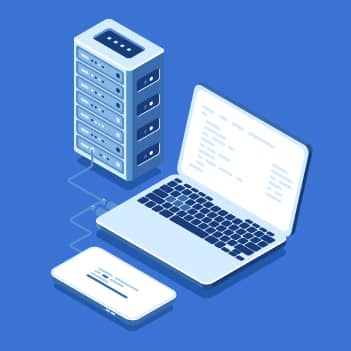
It is a software testing methodology that ensures two services are compatible and can communicate with each other. The contract is between the consumer who wants to receive some data and a provider, i.e., an API which provides data to the client. This test captures the interactions between services, stores them in a contract, and verifies that both parties adhere to it.
Runtime/Error detection testing:
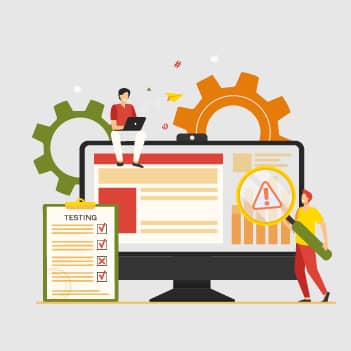
This testing method checks the actual running of the APIs and is mainly concerned with the universal results of utilizing the API codebase. It focuses more on monitoring, execution errors, resource leaks, error detections, etc.
Security testing:
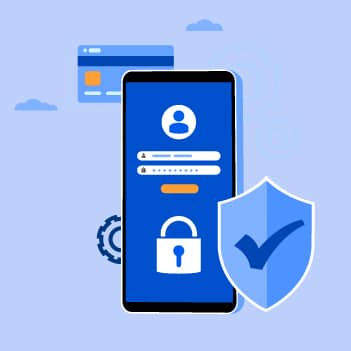
This testing method ensures secure API implementation and validates encryptions. It also verifies the design of the API access control to ensure its safety from external threats and validates the user rights and authorization.
Penetration testing:
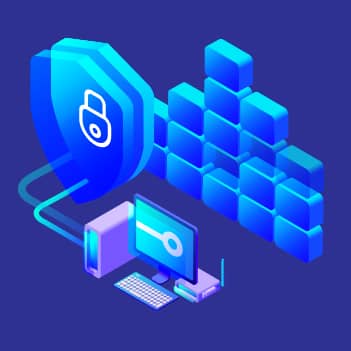
In this testing method, ethical hackers attack the API to assess possible threats or vulnerabilities from outside hackers. This testing process aims to reveal and exploit security vulnerabilities present in the APIs before actual hackers use them.
Fuzz testing:
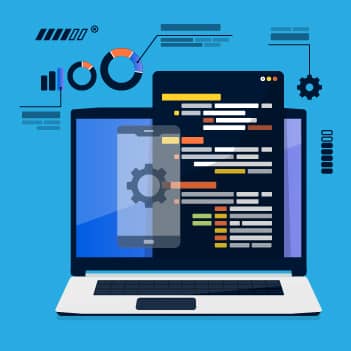
In this black-box testing method, a massive amount of random data often referred to as fuzz, or noise is forcibly input into the system to attempt a forced crash. The main aim of this test is to test the APIs at their absolute limits. The different types of attacks detected by fuzz testing are application fuzzing, protocol fuzzing, file format fuzzing, etc.
Interoperability/WS Compliance testing:

Interoperability testing checks whether the software can appropriately interact with other software components or not. This testing method only applies to SOAP APIs and is performed to check two fields of the functions. Firstly it reviews the interoperability between SOAP APIs and ensures it conforms to Web Services Interoperability Profiles. Secondly, WS Compliance testing ensures proper implementation and utilization of standards such as WS-Addressing, WS-Discovery, WS-Federation, WS-Policy, WS-Security, and WS-Trust.
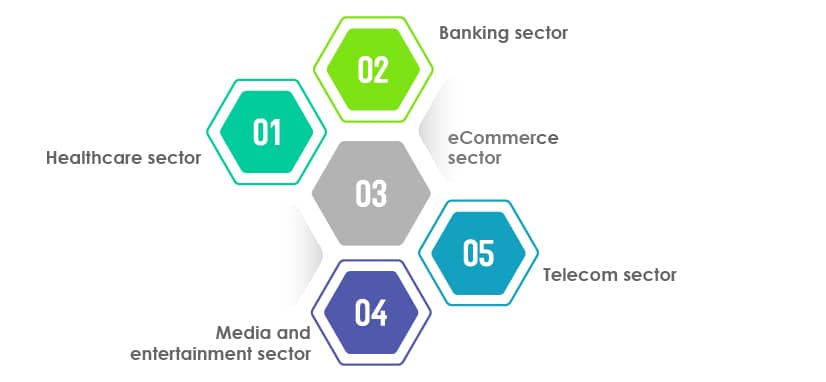
Today’s technology is rapidly advancing, and due to this, apps continue to become more complex in their underlying architecture. Usually, complex applications have five layers of complexity: complexities of integration, information, intention, environment, and institution. As more businesses continue to adopt modern architecture, including cloud services and mobile, large composite systems exist behind these simple-looking applications.
This complex architecture follows specific protocols such as XML, SOAP, JSON, REST, etc., and hence it becomes critically important for businesses to validate their applications for the underlying layers. These multiple layers need effective API testing to ensure the proper functioning of these APIs. These complex apps continue to dominate industries, and it showcases the need to leverage API testing to get fully functional apps.
Healthcare sector:

API testing plays an essential role in the healthcare sector as it helps:
• To ensure apps meet complex usage, security, and regulatory compliances such as HIPPA compliance.
• To ensure apps are bug-free and adequately integrated with third-party services.
• To ensure patient’s data, health records, identities, account details, payment information, etc., are safe within these interconnected healthcare apps.
Banking sector:
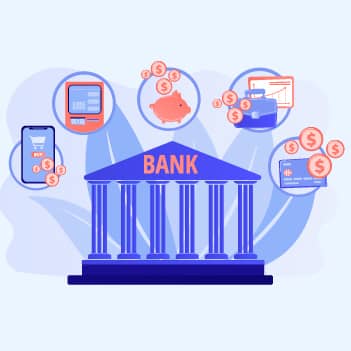
API testing plays a vital role in banks due to the following reasons:
• Most banks now offer API banking services spread across categories such as deposits, payment gateway, loans and cards, business banking, etc.
• Ensures proper functionality and security of payment-related information; API testing is essential.
• As banks continue to integrate with third-party services such as eCommerce sites, direct peer-to-peer transfer, ticket booking, API testing is essential.
• To meet regulatory compliances.
eCommerce sector:

API testing of eCommerce apps is essential because:
• Firstly, eCommerce apps have a complex architecture with multiple APIs such as:
• Product information API, Catalog API, Site search API, Login API, Cart API.
• Payment API, Marketing Automation API, Shipping API, etc.
• Secondly, it is essential to ensure seamless functioning and security of these APIs data.
• Lastly, to offer a great user experience with these eCommerce apps, API testing is required.
Media and entertainment sector:
 >
>
Media and entertainment service providers require API testing of their apps due to:
• As the consumers are shifting towards OTT platforms, there is more demand for high-quality streaming platforms and products
• Fully functional APIs help publishers to better connect with viewers and third-party services. With the help of API, content creators and distributors combine with partner technologies and attract more customers and hence need effective API testing
• API testing ensures seamless flow of content, good playback quality, and seamless UX for these publishing apps
Telecom sector:
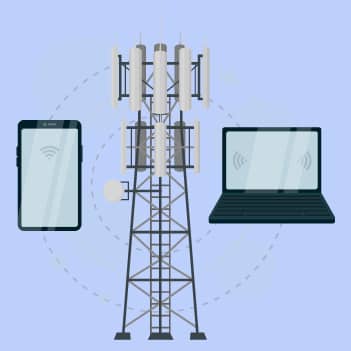
Below listed are some of the reasons that depict the need for API testing of telecom apps:
• Telecoms providers use various apps such as retailer app, mobile wallet, CRM app, vendor app, customer support app, etc., to provide services to users.
• There are multiple types of API layers present in these telecom apps such as Voice API, SMS API, Video API, Chat API, Geolocation API, Charging or Carrier Billing API, Mobile Top Up API, IoT API, Identity API, etc., and testing of all these API layers is essential to deliver seamless UX.
• Multiple users send multiple requests across these apps, and to ensure that their APIs function seamlessly, API testing is needed to enable seamless services to customers.
• Since these apps store a massive load of data and are accessed by a large set of users, API testing is essential for all telecom apps.
What benefits do businesses get with API testing?
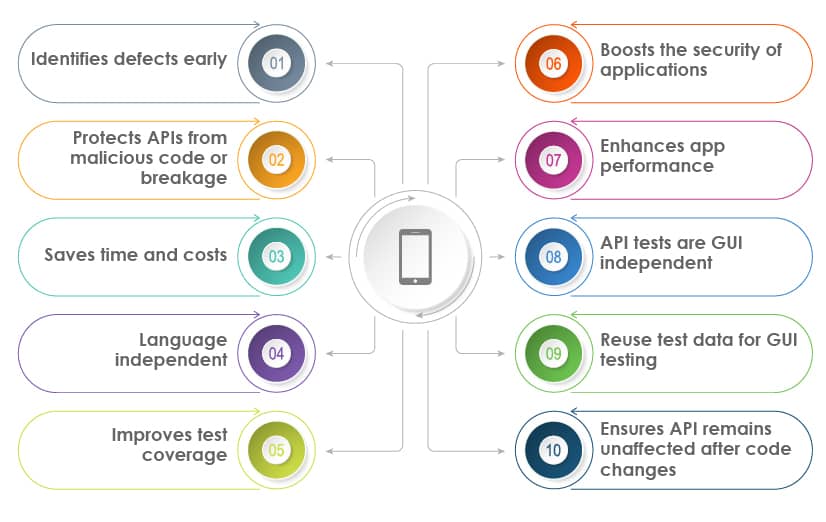
Identifies defects early:
The main advantage of API testing is that it allows testers to access the application without really interacting with the user interface. This testing helps testers to test the application faster and detect bugs early in the software development lifecycle.
Protects APIs from malicious code or breakage:
API testing helps businesses ensure that their APIs are free from all vulnerabilities and pushes applications to connective limits to ensure no code breakage occurs.
Saves time and costs:
Another benefit of this testing method is that it takes less time than GUI testing and helps businesses save time and costs in the long run.
Language independent:
API testing exchanges data using JSON or XML and comprises HTTP response and request. Both of these transfer modes are completely language-independent, allowing testers to test API using any language or automate API testing in any language.
Improves test coverage:
As compared to unit tests, API tests have a broader scope. In unit testing, the focus is limited to the functionality of the components within a single application, but the API test checks the functionality of all system components. This testing helps businesses to improve the overall software quality and to deliver seamless UX.
Boosts the security of applications:
API testing helps improve the application’s security and ensures there are no security loopholes or vulnerabilities present in the application; various security checks include security testing, penetration testing, fuzz testing, compliance testing, etc.
Enhances app performance:
API tests help remove performance-related bottlenecks present in the API of the application. This testing method helps businesses ensure their apps perform seamlessly under all conditions such as varying user load, network, bandwidth, etc.
API tests are GUI independent:
The API testing checks the business logic, and therefore this test starts even before the front-end is ready. Since this test is not related to the GUI of the app in any way, it becomes easy for testers to test the app earlier and faster.
Reuse test data for GUI testing:
The test data generated during API testing is helpful for GUI testing. Unlike the traditional software development approaches, developers now create apps by first writing the APIs. Once the APIs are tested and ready, the UI is designed around them.
Ensures API remains unaffected after code changes:
During API testing, the regression testing method ensures that recent changes do not affect or break the existing APIs or the system using them.
Broad steps involved in API Testing
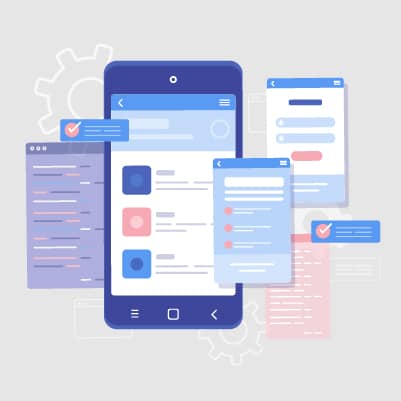
API Testing involves sending the API calls and checking the responses in return. The basic steps involved in API testing are:
• Gather information related to the kind of requests as well as the limitations involved. This information can be taken from API documentation or directly from developers.
• Set up the test environment that allows the testers to make API calls and validate responses
• Input the required API parameters and configure the database and server
• Write test cases that include – Input parameters, expected responses, max response time, parsing inputs, error handling, correct formatting of the response
• Add each test case to the test script and execute the test after every new build
• Monitor the results to decide if the API responses are as per expectations or not
Conclusion:
Today, with the evolving technology, apps are getting more complex in their underlying architecture with multiple layers. These numerous layers need API testing to validate the underlying business layers to ensure that apps function seamlessly and deliver a great CX.
Thus, businesses should leverage different types of API testing to get fully functional and seamless apps. It is always preferred to leverage the services from next-gen testing services providers to get fully functional business apps.
How can TestingXperts (Tx) help?
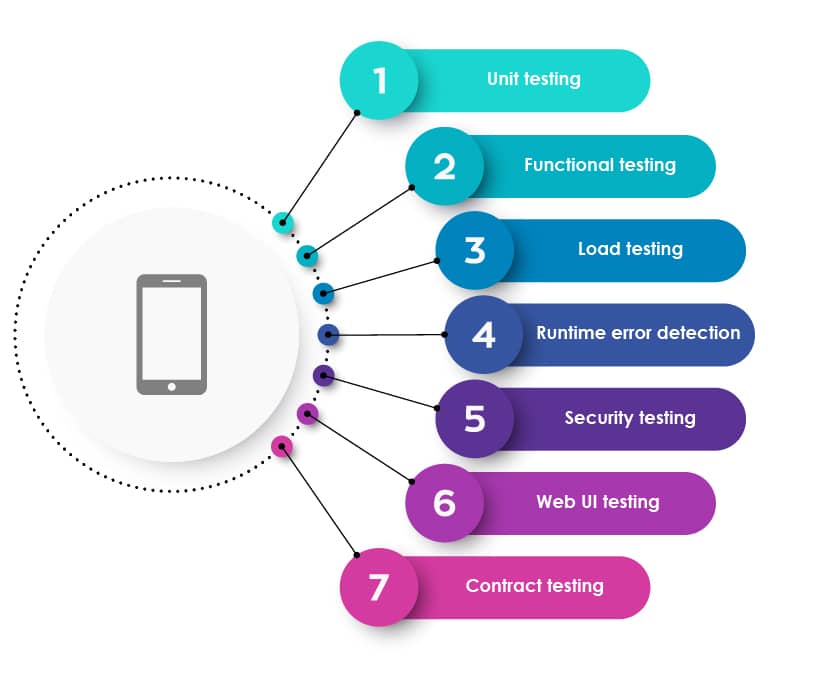
TestingXperts (Tx) has an expert team of API testers and offers a wide range of API and Web services testing:
Unit testing – for checking the functionality of individual APIs
Functional testing – for testing end-to-end functionality of the API layer
Load testing – for validation of functionality and performance for the system under various levels of user/ transaction load
Runtime error detection – Execution of automated/manual tests to identify problems, such as exceptions and resource leaks
Security testing – Involves various types of security checks like penetration testing, authentication, encryption, and access control
Web UI testing – end-to-end testing of the entire system using the APIs
Contract testing – for checking interaction between client and API or server and for verification of data exchanges occurring between two parties
Tx Differentiators:

• Expert API testers with expertise in a wide range of API protocols like XML, SOAP, JSON, REST, Gdata, YAML, ATOM, RSS, and RDF, etc.
• Experience to perform end-to-end application validations at various layers of the application
• Hands-on with the automation of API test cases
• Experience in testing code level functionalities and ensure test accuracy
• Certified team of testers, QAs, ethical hackers
• Dedicated teams with expertise in industry-leading open source and commercial tools
• Custom test execution report with a rich interface delivered to all stakeholders
• Partnership with industry leaders such as UiPath, Tricentis, AccelQ, EggPlant, etc.